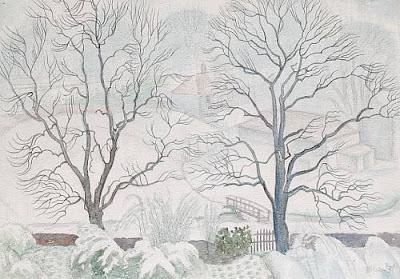J. C. Squire (1884-1958) is now known (if at all) as a traditionalist who was opposed to the project of literary "modernism." Whether that reputation is blameworthy or praiseworthy depends upon what one thinks of "modernism" and its spawn. But, like most generalizations, the "truth" about Squire is not as straightforward as it seems.
Thus, it should be noted that, as the editor of The London Mercury, he published the poetry of Ivor Gurney in the 1920s, when most other editors had become exasperated with Gurney's eccentricity. Time has shown that Gurney was as modern as they came in the 1920s. What's more, the fact that Squire got under T. S. Eliot's skin is, in my view, a good thing.
He also wrote poetry, nearly all of which has disappeared from view. However, every so often he came up with something memorable. We should always bear in mind that it is the poem, not the poet, that matters.
Douglas Percy Bliss, "Snow in April, Liberton, Edinburgh" (1924)
Late Snow
The heavy train through the dim country went rolling, rolling,
Interminably passing misty snow-covered plough-land ridges
That merged in the snowy sky; came turning meadows, fences,
Came gullies and passed, and ice-coloured streams under frozen bridges.
Across the travelling landscape evenly drooped and lifted
The telegraph wires, thick ropes of snow in the windless air;
They drooped and paused and lifted again to unseen summits,
Drawing the eyes and soothing them, often, to a drowsy stare.
Singly in the snow the ghosts of trees were softly pencilled,
Fainter and fainter, in distance fading, into nothingness gliding,
But sometimes a crowd of the intricate silver trees of fairyland
Passed, close and intensely clear, the phantom world hiding.
O untroubled these moving mantled miles of shadowless shadows,
And lovely the film of falling flakes, so wayward and slack;
But I thought of many a mother-bird screening her nestlings,
Sitting silent with wide bright eyes, snow on her back.
J. C. Squire, Poems, Second Series (1922).
Stanislawa de Karlowska, "Snow in Russell Square" (c. 1935)
Subscribe to:
Post Comments (Atom)





2 comments:
Mr. Pentz,
I regret to say that, until now, J.C.Squire was not known to me at all, but I must thank you for the introduction. "Late Snow" is a delightful poem. I found it wonderfully evocative. Two years ago I travelled by train from London to Glasgow through 400 miles of landscapes blanketed in snow. It was an amazing, unforgettable,journey. Had I known of "late Snow" then, I'm sure it would have immediately come to mind. I'm sure that on future snowy forays it will certainly do so.
Best regards, Andy.
Mr McEwan: it's always good to hear from you. I'm delighted to have introduced you to "Late Snow." I also recommend another poem by him: "Winter Nightfall." Believe it or not, it is a sort of precursor to Larkin's "Mr Bleaney."
Your anecdote about your London to Glasgow trip is very nice: I can see how "Late Snow" would resonate for you. And, even though I have never been fortunate enough to make such a journey, "Late Snow" is so well done that I can almost imagine that I have!
Thank you for visiting again.
Post a Comment